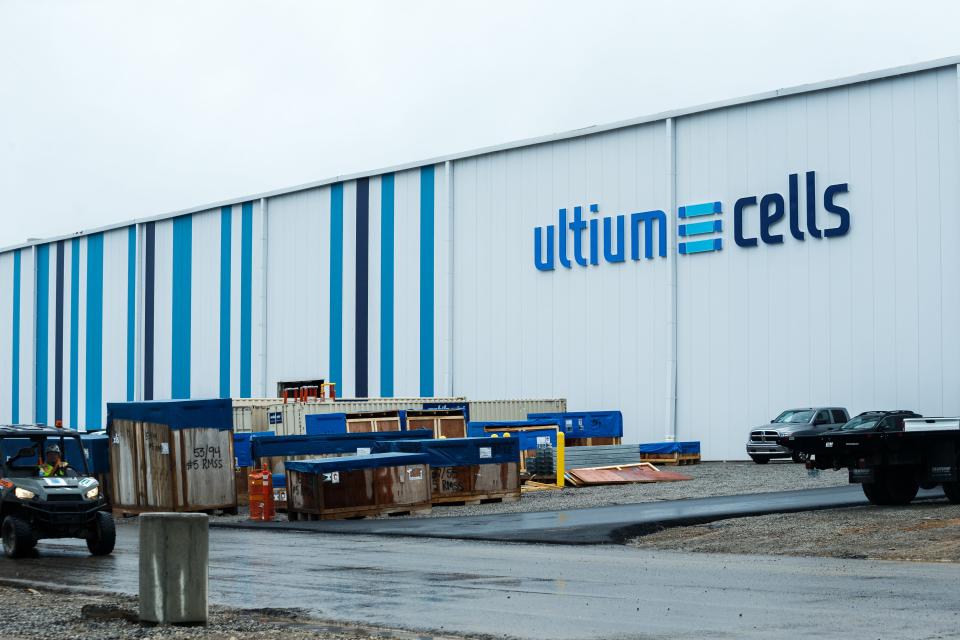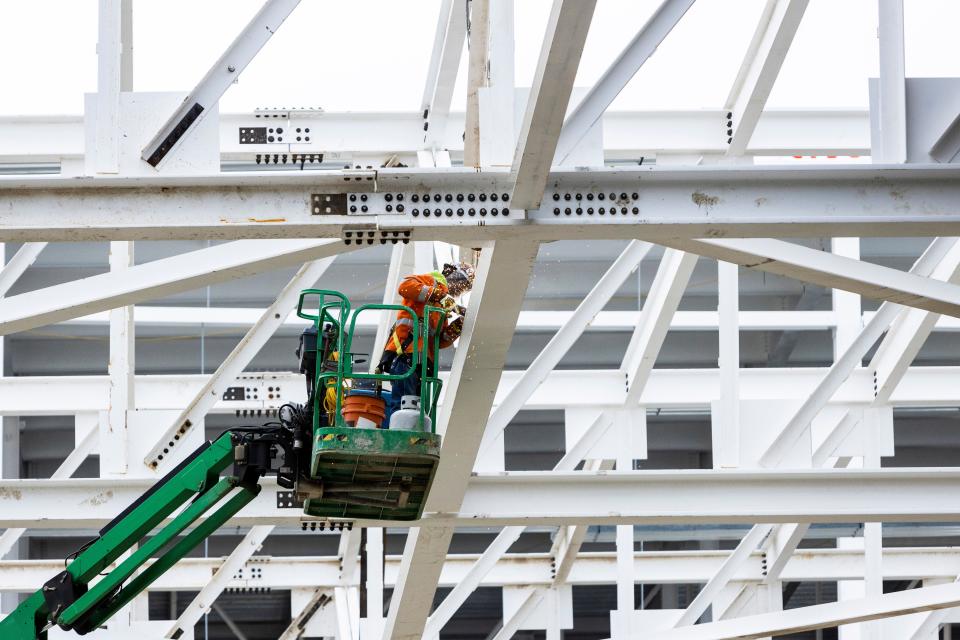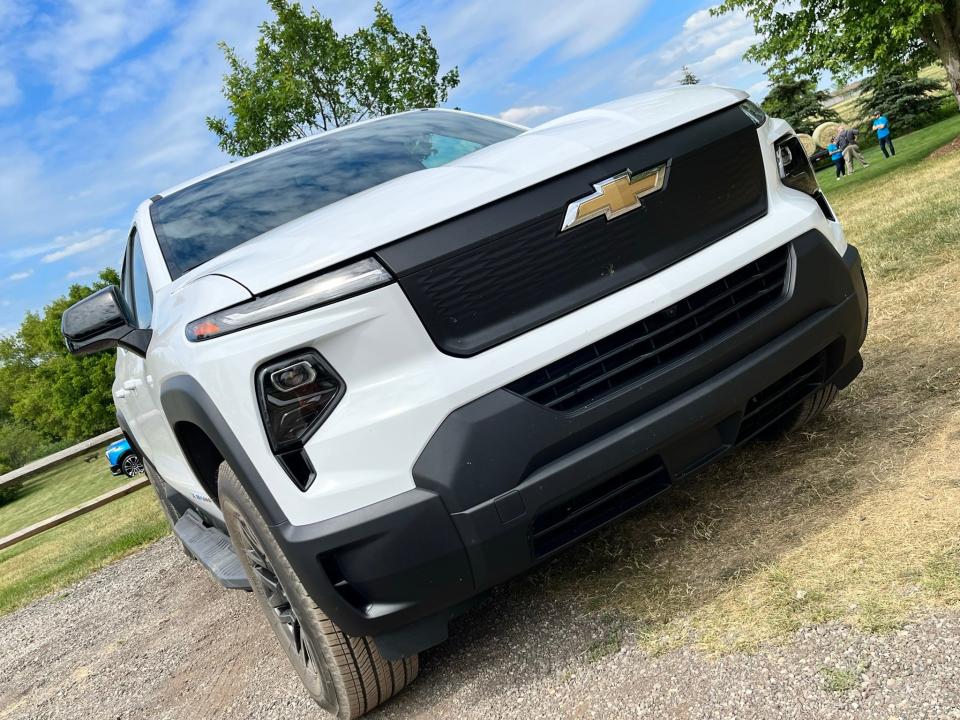The South — and its batteries — looms over the autoworkers strike
Correction: The original version of this story did not mention that workers at a GM parts distribution center in Memphis joined the UAW strike in late September.
The United Auto Workers strike against General Motors, Ford and Stellantis is about money. It is about cost of living increases. It is about job security for the men and women who build the cars. But the issue looming behind many of those demands, for both the companies and the workers, is the transition to electric vehicles. The UAW made that clear on Friday when the trumpeted an agreement with GM to add workers at its battery plants to the union contract.
“For Detroit automakers, EVs are absolutely central to the strike. They are headed into this unknown future into which they’re pouring billions of dollars,” said Micheline Maynard, a longtime auto journalist and publisher of the Substack newsletter “Intersection: Everything That Moves.”
The UAW strike has not yet reached Tennessee car plants, although in late September workers at a GM parts distribution in Memphis joined the picket lines. And most of the state’s auto workers do not belong to a union. But Tennessee and the rest of the South is where legacy car makers are building their battery-fueled future. What is taking shape in the South, sometimes called the “battery belt,” is on the minds of union leaders. And the outcome of the UAW strike could have consequences for Tennessee workers.

How the Battery Belt was built
Elon Musk’s upstart Tesla continues to dominate the EV market, making more than half of the electric automobiles sold in the U.S. Tesla’s factories are in California, Nevada and Texas. But many other car makers, from BMW in South Carolina, Kia in Georgia and Ford in Kentucky, are either already making EVs in the South or investing in new factories to produce them.
In Tennessee, Volkswagen builds its all-electric ID.4 in Chattanooga, GM makes its Cadillac Lyriq EV in Spring Hill and the massive new BlueOval City outside Memphis will produce a new Ford EV pickup truck.

“The incentive packages were incredible that the automakers got to locate to the South,” Maynard said.
The South also has fewer unions, often because laws like “right to work” statutes make it hard to organize.
The lack of unions gave car companies more flexibility in who they could hire at their new Southern factories.

“There was no shortage of people that wanted to work in these car plants,” Maynard said. “That allowed the companies to essentially select the people that they thought would be most suited to automotive work and most open to the kind of flexibility the car companies wanted.”
The lack of unions, and the often weaker economies of Southern states, also meant that car companies could pay less for labor.
The established car manufacturers frequently partner with other companies to build batteries for their EVs, like Ford’s partnership with Korean company SK at BlueOval City or GM's joint venture in Spring Hill with LG Energy Solutions, also a Korean company. The partners bring expertise in manufacturing batteries. These joint ventures are often not required to use union labor. The UAW, however, has already announced plans to organize the new factories in Tennessee.
Will Tucker, the Southern program director for the workers advocacy group Jobs to Move America, sees newly arrived car manufacturers taking advantage of a culture in the region that historically has not supported the interests of workers.
“When you look at who’s doing the investment, it’s typically non-union companies moving into states with legacies of worker exploitation, low pay and less than good jobs,” Tucker said.
The future is electric
Union leaders, like Shawn Fain of the UAW, see the rise in car production in states with less organized labor and hope to lock in better wages and benefits for their members. And they hope to grow their membership in these states.
The unions also view the transition to EVs as a threat, because electric cars are simpler and will likely require fewer workers to build.
“It’s not crystal clear how much less labor will be required. We know, for example, to produce an internal combustion engine requires the assembly of about 2,000 parts, while it requires the assembly of 20 parts for electric vehicles,” said Marick Masters, a professor at the Mike Ilitch School of Business at Wayne State University in Detroit.

The recent investment in EV manufacturing plants has often been supported by public money, like the Inflation Reduction Act passed by the Biden administration.
“If states are giving money to the manufacturers, and the federal government is giving money to the manufacturers, then I think the workers have some bargaining power,” said Joshua T. White, a professor at the Owen Graduate School of Management at Vanderbilt Univeristy. “They’re saying, look, you need to share some of that profit.”
Car manufacturers have seen record profits in recent years, and CEOs have taken home huge pay packages. Those profits were driven by the rise in car prices due to COVID-era supply issues.
The car companies know profits will soon fall, as they invest in EVs. The legacy U.S. car manufacturers face stiff competition from newcomers like Tesla and the truck maker Rivian along with foreign companies.
“There’s no guarantee that Detroit will win this competition,” said Masters of Wayne State.
Technology advances and scaling up production will likely lower the cost of making EVs. But today companies find it hard to make a profit on electric cars and trucks.
“The only way you can preserve margins is raise prices or lower costs,” said White of Vanderbilt. “And I think they’re going to struggle to raise prices beyond what they’re charging now.”
A bright future in the South?
If the UAW comes away from its current strike with a strong contract, it could help unions gain members in the South and at plants that are joint ventures with foreign companies.
“I think they would like to take it to the workers there and say, this is one reason why you should consider joining us. These are the wages you’ll get. These are the health and safety provisions you’ll get,” Masters said.
Even if unions do not gain new members in the South, winning a favorable contract could still benefit workers in the region.
“If you raise the standard for what a good job is through an action like this, that’s going to benefit Southern workers who can stand up and demand the same,” said Tucker of Jobs to Move America.
A big union win, others predict, might also drive more manufacturing to the Southern states like Tennessee where labor is cheaper and unlikely to be unionized.
“I’m sure the UAW wouldn’t want me to say this, but if they win what they’re asking for there are going to be fewer jobs up here,” Maynard said.
The UAW, says White of Vanderbilt, will almost certainly win higher wagers and better benefits from this strike. The unions gave car companies concessions after the 2008 financial crisis, and now the companies are making enormous profits. It will be hard for the manufacturers not to share those profits with workers.
But White believes the outcome of the strike will have little effect on the growth of car production in the South.
“That’s not going to stop no matter what the outcome is of this. The writing seems to be on the wall with EV battery production all taking place throughout the South,” he said.
Todd A. Price is a regional reporter for the USA TODAY Network. He can be reached at taprice@gannett.com.
This article originally appeared on Nashville Tennessean: The South — and its batteries — looms over the UAW strike

